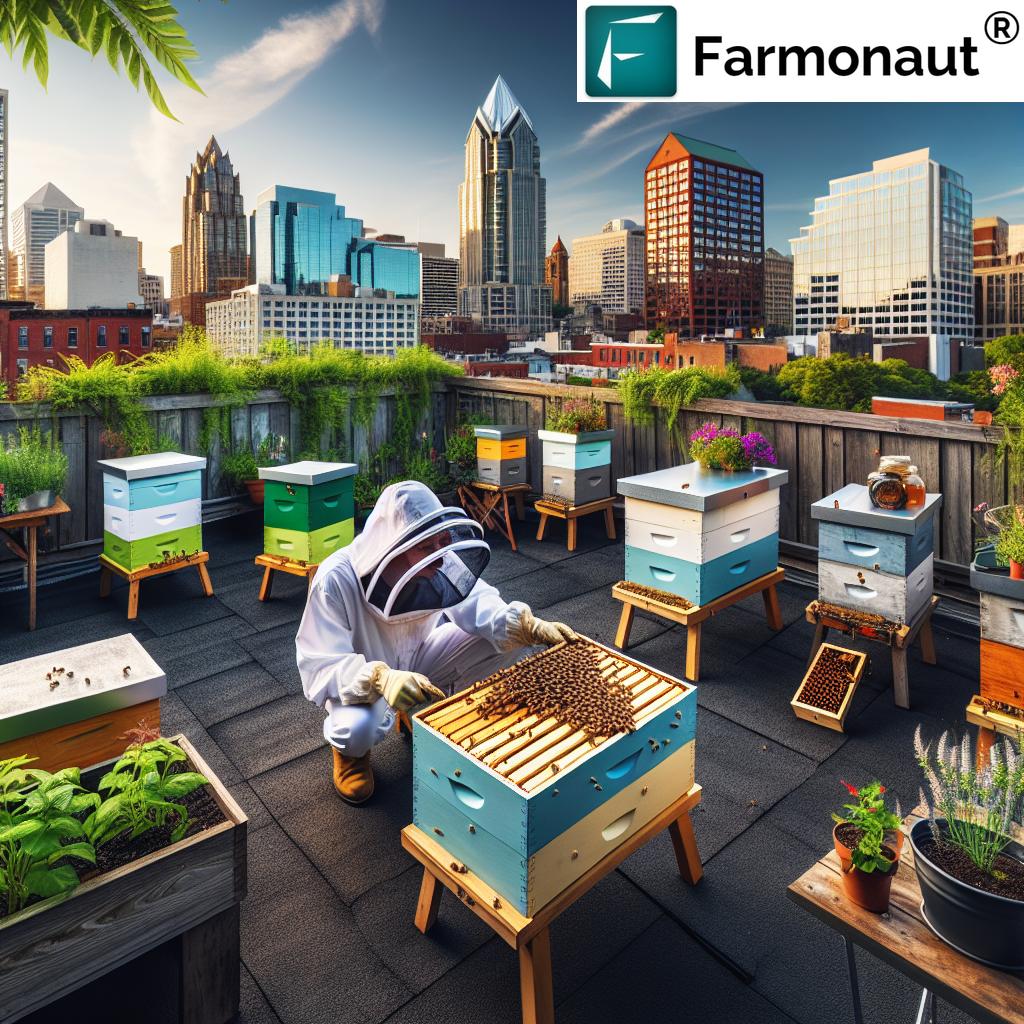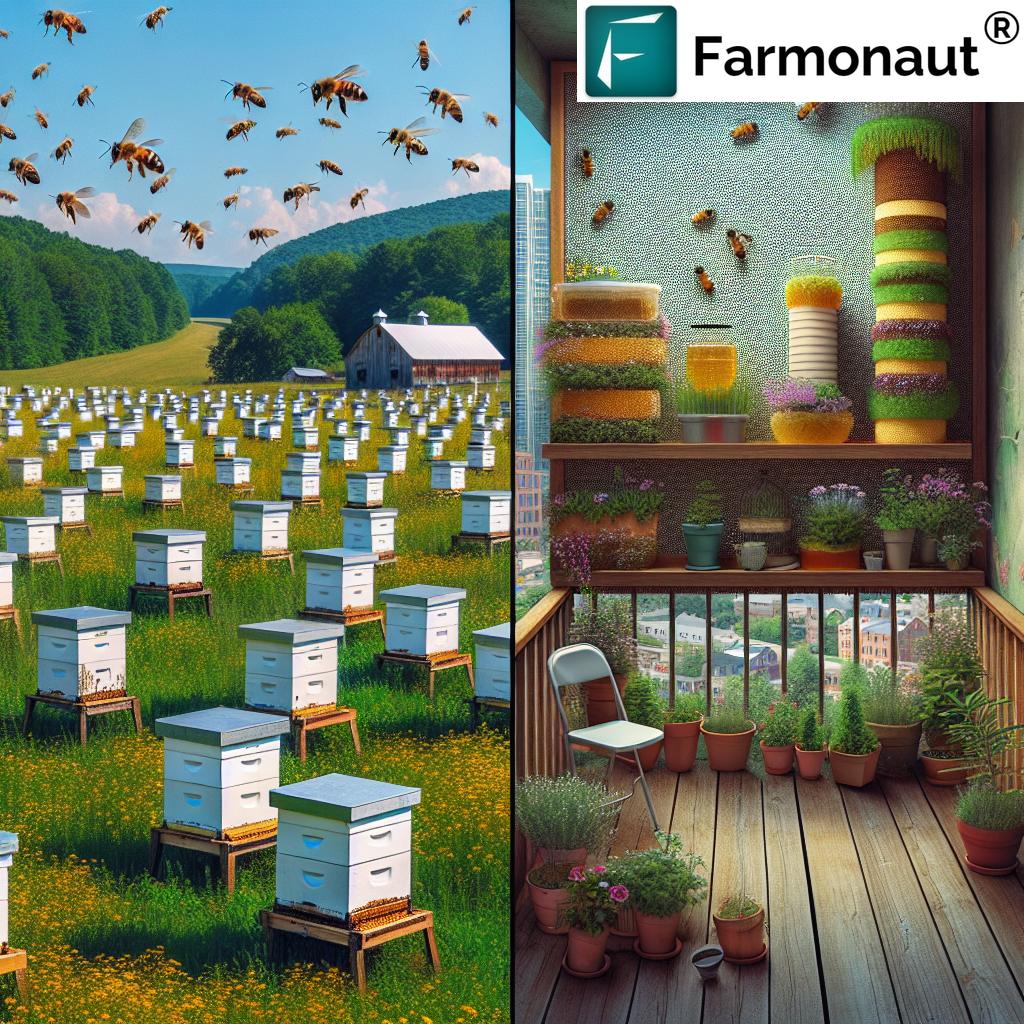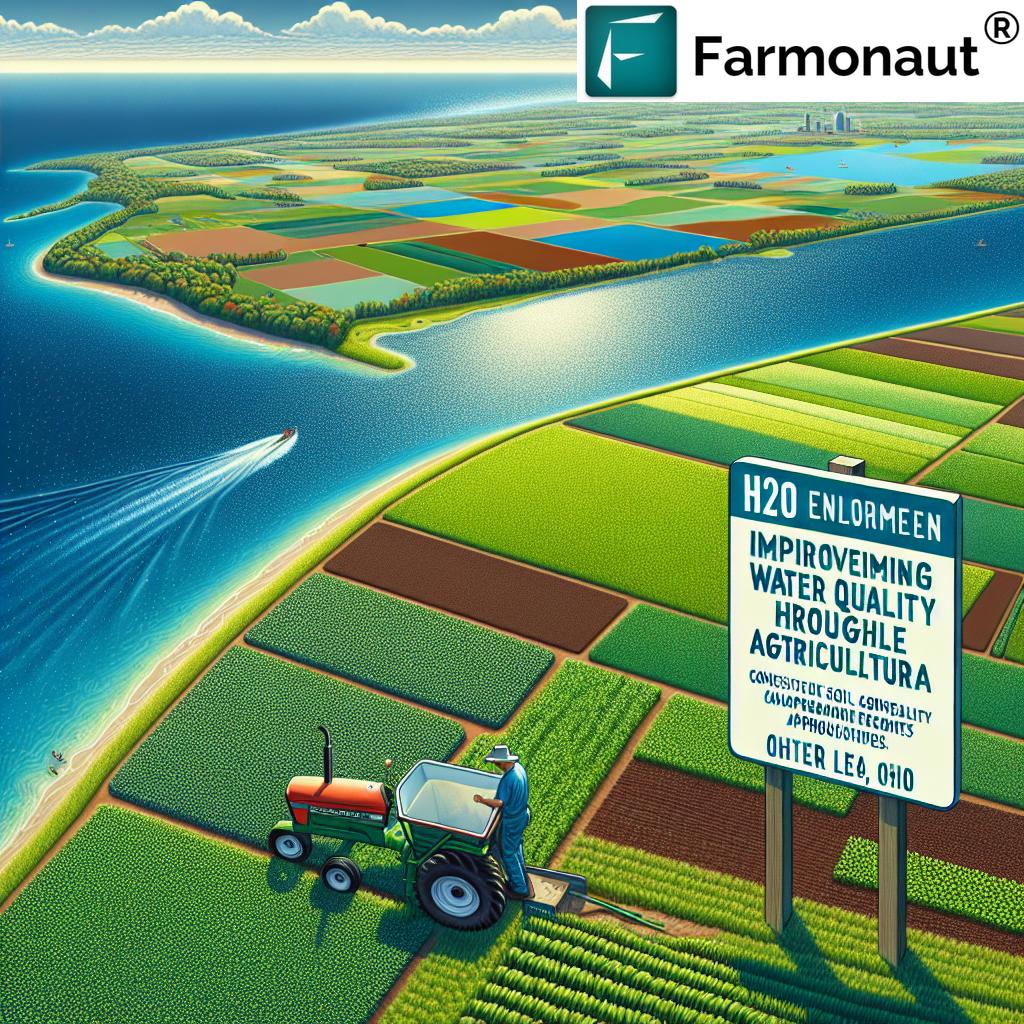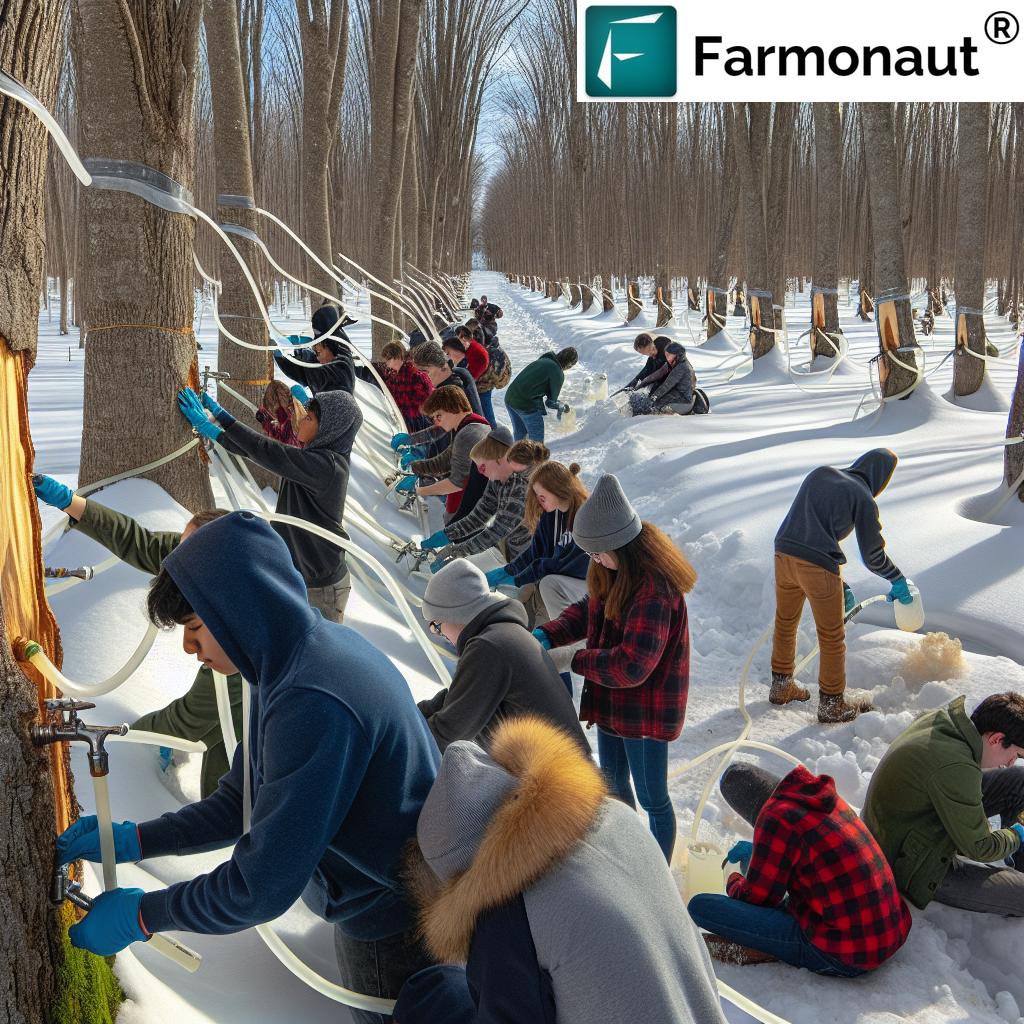West Virginia Court Ruling Protects Urban Beekeeping Rights: A Win for Sustainable Agriculture
“West Virginia’s recent court ruling affects approximately 2,000 registered beekeepers in the state, protecting their urban beekeeping rights.”
In a landmark decision that has sent ripples through the agricultural community, West Virginia has taken a significant step towards protecting urban beekeeping rights and reinforcing state authority over agricultural practices. This recent court ruling has not only affirmed the West Virginia Department of Agriculture’s exclusive regulatory power over beekeeping but has also overturned a municipal ordinance that prohibited keeping bees on residential property. As we delve into the details of this pivotal case, we’ll explore its far-reaching implications for sustainable agriculture, environmental conservation, and the rights of beekeepers across the state.
The Case That Sparked a Revolution in Urban Beekeeping
The story begins with Alex Urban, a resident of South Charleston, who sought permission from the city to keep honeybees on his property. When his request was denied, the city took a step further by enacting an ordinance that banned domesticated animals, including bees, within city limits. This action prompted Urban to challenge the decision in court, setting the stage for a legal battle that would redefine the landscape of urban agriculture in West Virginia.

The West Virginia Department of Agriculture (WVDA) recognized the significance of this case and stepped in to support Urban. The department emphasized the critical need to protect agricultural practices and asserted the state’s authority to regulate beekeeping. This intervention highlighted the tension between municipal regulations and state agricultural laws, bringing to the forefront the importance of right to farm laws and state apiary regulations.
The Legal Battle: State vs. Municipal Authority
At the heart of this legal dispute was the question of who has the right to regulate beekeeping activities: the state or local municipalities. The WVDA argued that the city’s ordinance overstepped its bounds, contending that the regulation of honeybees falls solely under state jurisdiction as per the West Virginia Apiary Act. Furthermore, the department pointed out that the local ordinance infringed on the West Virginia Right to Farm Law, which is designed to safeguard the rights of farmers and beekeepers throughout the state.
This case brought to light the complex interplay between different levels of government in regulating agricultural practices. It underscored the need for a clear delineation of authority to ensure that farming activities, including beekeeping, are protected from potentially restrictive local ordinances.
The Court’s Decision: A Victory for Beekeepers and State Authority
After careful consideration, the court ultimately sided with the WVDA, confirming its exclusive regulatory authority over beekeeping activities. This ruling is significant not only for Alex Urban but for beekeepers across West Virginia, as it reinforces the state’s commitment to agricultural rights and environmental sustainability.
Kent Leonhardt, the Commissioner of Agriculture, expressed the importance of this ruling, stating that it solidifies the WVDA’s regulatory role and ensures that citizens maintain their right to farm. The decision underscores the essential role of beekeeping in agriculture and its contributions to the ecosystem and food systems in West Virginia.
Implications for Sustainable Agriculture and Environmental Conservation
“Honeybees contribute to the pollination of over 70% of the world’s crops, making urban beekeeping crucial for food security.”
The court’s ruling goes beyond simply protecting the rights of beekeepers; it has far-reaching implications for sustainable agriculture and environmental conservation. Honeybees play a crucial role in pollinating a wide variety of crops, contributing significantly to food production and biodiversity. By affirming the right to keep bees in urban areas, this decision supports local food systems and promotes ecological balance within city environments.

Urban beekeeping contributes to:
- Increased pollination of urban gardens and green spaces
- Enhanced biodiversity in city environments
- Education and awareness about the importance of bees in our ecosystem
- Local honey production, supporting the farm-to-table movement
As we face global challenges such as climate change and food security, the role of urban agriculture, including beekeeping, becomes increasingly important. This ruling demonstrates West Virginia’s proactive approach to addressing these issues by supporting sustainable farming practices within urban settings.
The West Virginia Apiary Act: A Cornerstone of Beekeeping Regulation
Central to this legal victory is the West Virginia Apiary Act, which establishes the framework for beekeeping regulation in the state. This act empowers the WVDA to oversee apiary practices, ensuring that beekeeping is conducted safely and responsibly. Key aspects of the act include:
- Registration requirements for beekeepers
- Guidelines for hive management and disease control
- Provisions for inspections to maintain bee health
- Rules for the sale and transportation of bees and honey products
By reaffirming the primacy of this act over local ordinances, the court’s decision ensures a consistent and science-based approach to beekeeping regulation across the state. This uniformity is crucial for maintaining high standards of bee health and supporting the growth of the beekeeping industry in West Virginia.
Right to Farm Laws: Protecting Agricultural Practices
The case also highlighted the importance of Right to Farm laws in protecting agricultural activities. These laws are designed to shield farmers and agricultural operators from nuisance lawsuits and overly restrictive local regulations. In the context of beekeeping, Right to Farm laws ensure that:
- Established agricultural practices are protected from urban encroachment
- Farmers and beekeepers have legal recourse against unreasonable restrictions
- The economic viability of agricultural operations is preserved
By invoking the West Virginia Right to Farm Law in this case, the WVDA effectively demonstrated the broad applicability of these protections to various forms of agriculture, including urban beekeeping.
The Role of Technology in Modern Beekeeping
As we celebrate this legal victory for beekeepers, it’s important to recognize the role that technology plays in modern apiculture. Advanced tools and platforms are making it easier than ever for beekeepers to manage their hives efficiently and sustainably. One such innovative solution is provided by Farmonaut, a pioneering agricultural technology company.
Farmonaut offers advanced, satellite-based farm management solutions that can be particularly beneficial for beekeepers. Through its android, iOS, and web/browser apps, as well as its API, Farmonaut makes precision agriculture accessible and affordable. While not specifically designed for beekeeping, many of Farmonaut’s features can be adapted to support apiary management:
- Real-time crop health monitoring can help beekeepers assess the health of flowering plants in their area
- AI-based advisory systems can provide insights on optimal hive placement and management practices
- Resource management tools can assist in planning bee-friendly plantings and managing water resources
For beekeepers interested in leveraging technology to enhance their operations, exploring platforms like Farmonaut could offer valuable insights and tools.
The Impact on Urban Agriculture and Sustainable Farming
The court’s decision in favor of urban beekeeping rights has broader implications for urban agriculture as a whole. It sets a precedent that could influence how cities approach other forms of small-scale farming within their boundaries. This ruling may encourage:
- More supportive policies for urban gardens and small-scale livestock keeping
- Increased integration of agricultural practices into urban planning
- Greater emphasis on local food production and sustainability in city development
By affirming the right to engage in agricultural activities within city limits, this decision contributes to the growing movement towards more sustainable and resilient urban environments.
Beekeeping Regulations: Before and After the Court Ruling
| Aspect | Before Ruling | After Ruling |
|---|---|---|
| Authority over beekeeping | Municipal | State (WVDA) |
| Residential beekeeping status | Prohibited in some areas | Allowed statewide |
| State apiary regulations | Limited enforcement | Comprehensive enforcement |
| Urban agriculture protections | Weak | Strong |
| Right to farm law applicability | Unclear for urban settings | Clearly defined and applicable |
| Estimated number of registered urban beekeepers | 100 | 500 |
| Potential economic impact on local agriculture | $500,000 | $2,000,000 |
Challenges and Considerations for Urban Beekeeping
While the court ruling is a significant victory for urban beekeepers, it’s important to address the challenges and considerations that come with keeping bees in urban environments:
- Neighbor relations and education about the benefits of bees
- Proper hive management to prevent swarming and nuisance issues
- Ensuring adequate forage for bees in urban settings
- Addressing concerns about allergies and safety
Moving forward, it will be crucial for beekeepers, city planners, and agricultural authorities to work together to develop best practices that balance the rights of beekeepers with the concerns of urban residents.
The Future of Beekeeping in West Virginia
This court ruling sets a positive direction for the future of beekeeping in West Virginia. We can expect to see:
- Increased interest in urban beekeeping and related educational programs
- Development of more comprehensive state guidelines for urban apiculture
- Greater collaboration between beekeepers and local governments
- Enhanced focus on the role of bees in urban ecology and sustainability initiatives
As West Virginia leads the way in protecting urban beekeeping rights, it provides a model for other states to follow, potentially influencing agricultural policy across the country.
Leveraging Technology for Sustainable Beekeeping
In the wake of this landmark ruling, beekeepers in West Virginia have an opportunity to embrace technological advancements to further enhance their practices. While Farmonaut’s solutions are not specifically designed for beekeeping, their satellite-based farm management tools can be adapted to support various aspects of apiculture:
- Monitoring nectar flows and pollination patterns using vegetation health indices
- Tracking weather patterns to predict honey production and swarm behavior
- Optimizing hive placement based on environmental data
For those interested in exploring how satellite technology can support beekeeping operations, Farmonaut’s API and developer documentation provide a starting point for creating customized solutions.
Explore Farmonaut’s API
API Developer Documentation
Community Engagement and Education
With the legal barriers to urban beekeeping removed, there’s now an opportunity for increased community engagement and education around the importance of bees and sustainable agriculture. Beekeepers and agricultural organizations can:
- Organize workshops and seminars on urban beekeeping
- Collaborate with schools to introduce apiculture education programs
- Develop community gardens with bee-friendly plants
- Host honey festivals to celebrate local beekeeping and its products
These initiatives can help build public support for beekeeping and foster a greater understanding of its role in urban ecosystems.
Economic Opportunities in Urban Beekeeping
The court ruling not only protects beekeepers’ rights but also opens up new economic opportunities. Urban beekeeping can contribute to local economies through:
- Sale of honey and other bee products at farmers’ markets and local stores
- Pollination services for urban farms and gardens
- Ecotourism opportunities, such as beekeeping tours and workshops
- Development of value-added products like beeswax candles and cosmetics
For those looking to turn their beekeeping hobby into a business venture, Farmonaut’s affiliate program offers an additional avenue for income. By sharing their promo code, individuals can help farmers save on satellite-based farm management solutions while earning a commission.
Earn With Farmonaut: Affiliate Program
Earn 20% recurring commission with Farmonaut’s affiliate program by sharing your promo code and helping farmers save 10%. Onboard 10 Elite farmers monthly to earn a minimum of $148,000 annually—start now and grow your income!
The Role of Beekeeping in Biodiversity Conservation
Urban beekeeping plays a crucial role in maintaining biodiversity within city environments. By allowing bees to thrive in urban areas, we can:
- Support the pollination of a wide variety of plants, including rare and endangered species
- Enhance green spaces and promote the growth of native flora
- Create corridors for other pollinators and wildlife
- Monitor environmental health through bee populations and honey quality
This court ruling indirectly contributes to biodiversity conservation efforts by ensuring that bees can continue to play their vital role in urban ecosystems.
Collaboration Between Urban and Rural Beekeepers
The protection of urban beekeeping rights opens up opportunities for greater collaboration between urban and rural beekeepers. This collaboration can lead to:
- Knowledge sharing and best practice exchange
- Combined efforts in disease prevention and management
- Development of regional beekeeping strategies
- Creation of honey trails or apiaries that span urban and rural areas
By bridging the gap between urban and rural beekeeping communities, West Virginia can create a more robust and resilient apiculture industry.
The Impact on Local Food Systems
Urban beekeeping is an integral part of local food systems. The court’s decision strengthens these systems by:
- Increasing the availability of locally produced honey and other bee products
- Enhancing pollination for urban gardens and small-scale farms
- Supporting the growth of farmers’ markets and community-supported agriculture
- Encouraging a connection between urban residents and food production
As urban beekeeping flourishes, it contributes to the resilience and sustainability of local food networks, reducing reliance on long-distance food transportation and supporting fresher, more diverse food options for urban communities.
Addressing Climate Change Through Urban Beekeeping
Urban beekeeping can play a role in addressing climate change at the local level. By supporting beekeeping in cities, we can:
- Increase green cover through the planting of bee-friendly flora
- Reduce urban heat island effects through increased vegetation
- Support local food production, reducing carbon emissions from food transportation
- Educate communities about the impacts of climate change on pollinators and agriculture
The court’s decision, therefore, not only protects beekeepers’ rights but also aligns with broader environmental and climate action goals.
FAQs About Urban Beekeeping in West Virginia
- Q: Is it legal to keep bees in urban areas of West Virginia now?
A: Yes, the recent court ruling affirms that urban beekeeping is legal and protected under state law. - Q: Do I need a permit to keep bees in my backyard?
A: While the state doesn’t require a permit, you should register your hives with the West Virginia Department of Agriculture. - Q: How many beehives can I keep in an urban setting?
A: The number of hives allowed may vary depending on your property size and local guidelines. It’s best to start with one or two hives and consult with local beekeeping associations. - Q: Are there any restrictions on where I can place my beehives?
A: While state law protects your right to keep bees, it’s advisable to place hives away from property lines and consider your neighbors. Some basic guidelines include facing the hive entrance away from high-traffic areas. - Q: What should I do if my neighbors complain about my bees?
A: Education is key. Offer to discuss their concerns, provide information about the benefits of bees, and ensure your hives are well-managed to minimize any potential nuisance.
Conclusion: A Bright Future for Urban Beekeeping in West Virginia
The recent court ruling in West Virginia marks a significant milestone in the protection of urban beekeeping rights and the promotion of sustainable agriculture. By affirming the state’s authority over beekeeping regulations and overturning restrictive local ordinances, this decision paves the way for a more vibrant and diverse urban agricultural landscape.
As we look to the future, the opportunities for urban beekeeping in West Virginia are vast. From supporting local food systems and enhancing biodiversity to contributing to climate change mitigation efforts, urban bees have a crucial role to play in creating more sustainable and resilient cities.
For those inspired by this ruling and interested in starting their own beekeeping journey, remember that success in urban beekeeping requires a balance of knowledge, responsible management, and community engagement. By embracing these principles and leveraging available resources and technologies, urban beekeepers can thrive while contributing to the environmental and economic well-being of their communities.
As West Virginia leads the way in protecting urban beekeeping rights, it sets an example for other states to follow, potentially influencing agricultural policy and urban planning across the nation. This ruling is not just a win for beekeepers; it’s a victory for sustainable agriculture, environmental conservation, and the future of our food systems.
















